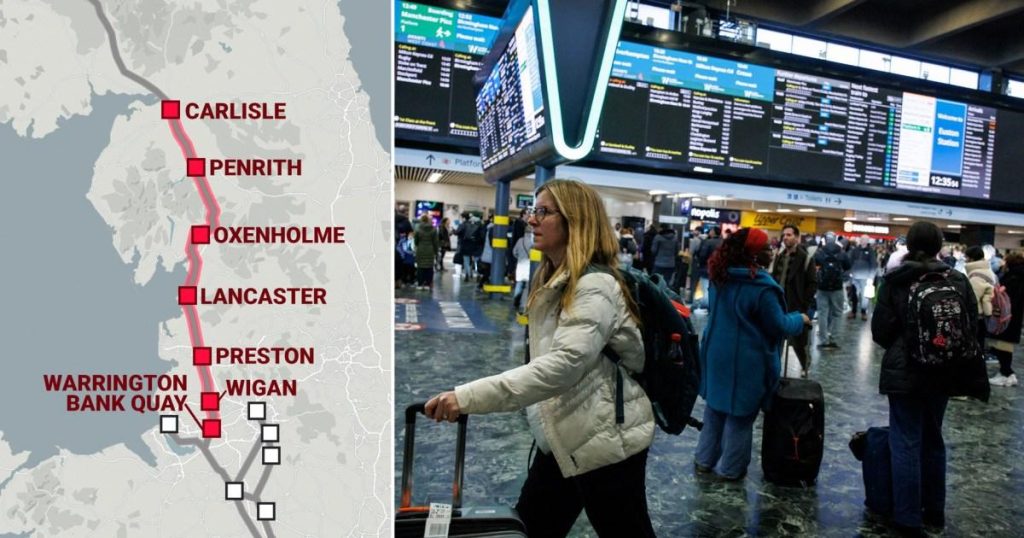The West Coast Main Line (WCML), a crucial artery of the UK rail network, is poised for a significant overhaul, promising improved infrastructure but also foreshadowing substantial disruptions for millions of passengers. Connecting major cities like London, Glasgow, Birmingham, Manchester, Liverpool, and Edinburgh, the WCML supports nine passenger train operators and numerous freight services. Network Rail, the owner and manager of the UK’s rail infrastructure, has announced plans for extensive engineering works, slated to commence in 2026, necessitating closures along sections of the line. These closures, projected to last for several weeks at a time each year, will impact a range of stations including Warrington Bank Quay, Wigan, Preston, Lancaster, Oxenholme, Penrith, and Carlisle. While the final details are still under discussion, the project’s scale underscores the potential for widespread travel disruption over the coming years.
The core of the project revolves around replacing over 150 miles of aging overhead electrical wires, originally installed in the 1970s, along with upgrading the signaling equipment and sections of track. This modernization effort, dubbed “Trilink,” aims to bring digital signaling to the northern section of the WCML, boosting capacity and reliability. While the long-term benefits are undeniable, the immediate impact will be felt by passengers. Network Rail anticipates closing the line in three two-week blocks annually between 2026 and 2028. These closures will necessitate significant adjustments to train schedules and potentially lead to extended journey times or alternative travel arrangements for passengers. The undertaking reflects the complex balancing act between maintaining and upgrading essential infrastructure while minimizing disruption to vital transport services.
The impact of these closures is likely to be substantial, impacting the timetables of all operators using the WCML. While specifics are still being finalized in consultation with the rail industry, the magnitude of the works suggests that significant adjustments to train schedules and potential delays are unavoidable. Avanti West Coast, a major operator on the route, has acknowledged the upcoming works but stated it’s too early to determine the precise impact on their timetable. The challenge for Network Rail and the train operators will be to effectively manage the closures, minimize passenger inconvenience, and provide clear and timely communication regarding alternative travel options. This will involve close coordination between Network Rail and the train operators to develop contingency plans and ensure passengers are kept informed.
This planned overhaul of the WCML comes on the heels of recent government announcements regarding the restructuring of the UK rail industry. The formation of Great British Railways, a new public body tasked with overseeing the nation’s rail network, signals a shift in the management and operation of the railways. Several train operators, including some that utilize the WCML, have been brought back under public control, reflecting a move towards greater government involvement in the rail sector. The timing of the WCML upgrades alongside these broader industry changes adds another layer of complexity to the situation. Coordinating the necessary closures with the ongoing restructuring efforts will require careful planning and communication between Network Rail, the train operators, and the newly established Great British Railways.
The WCML upgrades form part of a broader effort to modernize the UK’s rail infrastructure. The aging infrastructure on many lines necessitates significant investment to improve reliability, increase capacity, and enhance the passenger experience. Recent works on the WCML over the Christmas and New Year period, which impacted services to and from London Euston, highlight the ongoing need for maintenance and upgrades. These projects, while disruptive in the short term, are essential for ensuring the long-term viability and efficiency of the rail network. The challenge lies in effectively managing these disruptions and ensuring that passengers are adequately informed and accommodated during periods of planned engineering works.
The planned closures on the WCML underscore the challenges inherent in maintaining and upgrading critical infrastructure while minimizing disruption to essential services. The scale of the project, the number of stakeholders involved, and the potential impact on millions of passengers create a complex logistical puzzle. Effective communication, meticulous planning, and close collaboration between Network Rail, the train operators, and the government will be crucial to navigating these challenges and ensuring that the upgrades are delivered with minimal disruption to the traveling public. The ultimate goal is a modernized, more reliable, and efficient WCML, capable of serving the needs of a growing passenger base for decades to come. Achieving this goal will require patience and understanding from passengers as the necessary upgrades are implemented.











